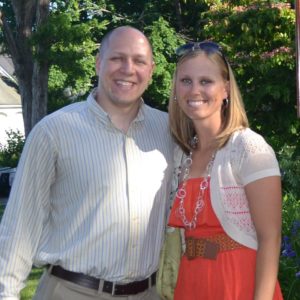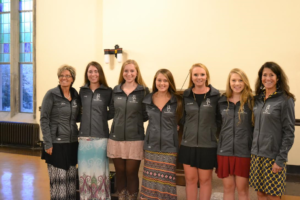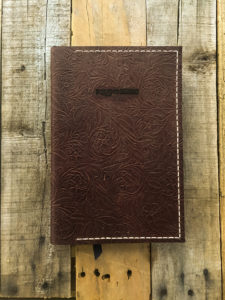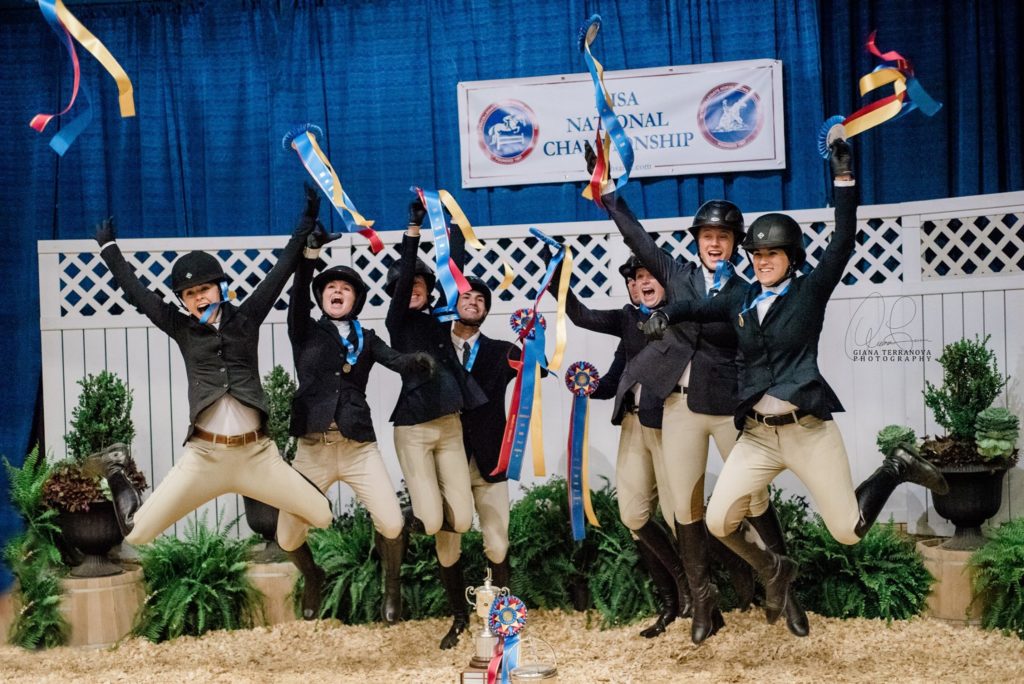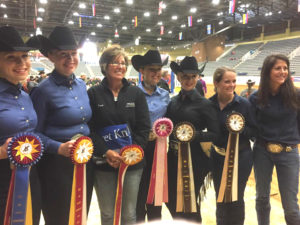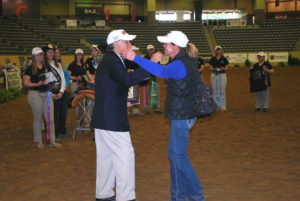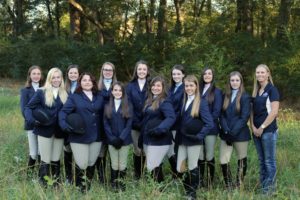
BY LIZ CRUMBLY
Editor
Breakaway Farm – the name symbolizes not just a new beginning but a bold start. That’s exactly what its owner, Sarah Dubois, was getting at when she christened her then-fledgling training business in Braselton, Ga. almost four years ago.
And a bold start it was. Dubois began a new career, a family and competition in a new discipline at virtually the same time, but her tenacity has paid off in spades. She coached her first rider to IEA (Interscholastic Equestrian Association) Nationals in Wellington, Fla. earlier this year.
Breaking out
Dubois, by her own admission, has finally found her passion teaching young minds the ins and outs of the hunter ring, but she took the long way around in becoming a coach. After college, like so many lifelong equestrians, she felt compelled to get, in her words, a “real job.”
So, she flew a desk with Progressive Insurance for five years, handling auto claims.
“It was a really well-paying job,” she recalls, trailing off in the way horsemen do when it’s obvious their calling lies elsewhere.
She hung on to that nine-to-five security, but she had soon manufactured a double life for herself, teaching lessons in the evenings at a farm in Gainesville where she boarded her gelding, Ditto. Her typical workday ran from daylight to dark: Progressive from 7 a.m. to 4 p.m. and the barn afterward.
“I would be working all day, and I’d be at the barn by 4:30,” she recalls.
Despite the rigorous schedule, Dubois realized she was finding deep satisfaction conducting those evening lessons. She became the assistant trainer at that barn, and her affinity for teaching grew.
“That’s where I found my passion to teach kids to ride horses,” she says. “To me, it’s not work.”
One day, on impulse, she stopped by a facility in Braselton that she had heard was in need of a trainer. That barn, as it turned out, was the stepping stone that finally allowed her to stride fully into the equestrian world again. She took the head trainer position, and through a series of events over the following few months, she became the lessee of the property on Union Church Road, and Breakaway Farm was born.
Of course, none of these events were as simple as they seem on paper. Moving on from the barn in Gainesville where she had taught lessons for the past few years was a particularly difficult emotional decision, and Dubois also had to let go of the proverbial handlebars and make her final exit from the corporate world.
Perhaps the most complicated turn of events was this: as Breakaway was forming, so was another facet of Dubois life – she was pregnant with her son, Caleb. Somehow, the stars aligned, and she was able to keep her position at Progressive throughout her maternity leave – a particular point of relief.
“I was able to have a kid without the stress of not working,” as she puts it.
And then Dubois found herself as an entrepreneur handling the ins and outs of boarding, training and selling horses and hauling clients to shows. At the same time she also made her own break from hunters to take on the jumper ring competitively. Her constant reinforcement has been her husband Sean, a reliability engineer for Ethicon without, according to his wife, a horsey bone in his body.
“I don’t think he had ever touched a horse until he met me,” Dubois says of her husband.
He’s been game for the adventure, though, helping to propel her emotionally through the process of starting her own business.
“He’s been my 100 percent supportive backbone,” she says. “I was really worried about the security.”
He’s gotten pretty good with his fence-building and barn repair skills, and Dubois doesn’t hesitate to put him to work.
“Anything I need done, he does it,” she says.
All the way to Nationals
Breakaway soon became a hub for youth competitors, and today Dubois has a thriving IEA (Interscholastic Equestrian Association) program in a region where there seems to be a high school team on every corner. Read that to mean the competition is stiff in Zone 4, Region 6.
Despite the pressure, Dubois has thrived coaching middle and high schoolers in the Interscholastic format, and she has seen a path of leadership among her peers begin to open before her. She just completed her first year as Region 6 IEA president.
She is there every step of the way for her middle and high school teams, whose members compete all school year in what Dubois admits is a long season. All those long practice sessions and weekends on the road payed off this year, though, culminating in Wellington April 24-26 when Dubois shepherded middle school rider Angelica Davis, then 11, to IEA nationals as an individual competitor.
Davis is a tiny rider with a big heart; she “probably weighs about 50 pounds wet,” by Dubois’ estimation. There was no callback for finals this year for Davis, but Dubois was pleased just to have made that first trip as a coach.
Davis rode on the flat in the Future Beginner Equitation division, which, according to the IEA’s official website, rideiea.org, is open to riders in grades 6-8. Only the top eight riders, out of the handful who filter past the region and zone competitions, are placed at the national level, as Dubois points out.
“It was a huge accomplishment to go,” she explains. “(It was) the top 22 riders in every class in the country. Just to ride at nationals, I think, is a huge accomplishment.”
Dubois would know.
Ten years ago this year, she placed sixth in her individual novice over fences class at IHSA (Intercollegiate Horse Shows Association) nationals, where she rode for Berry College, an institution with a historically strong huntseat team that has been represented well and often at the national level.
That top-10 national ranking capped off an intercollegiate career for Dubois that had been studded with huntseat wins on the flat and over fences. Little did she know at that time that she would find herself on the other side of the rail, watching her own riders compete in a format much like the one she had become so familiar with.

